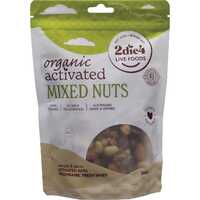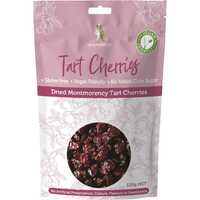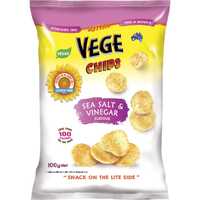The western world is full of snack foods, but most of them are heavily processed and far from healthy. From refined grains and artificial preservatives to excessive fat and sugar content, there are lots of reasons to avoid mainstream snack products. Luckily, a health food revolution has taken place over recent decades, with nutritious and delicious snack foods easier to find than ever before. There's nothing intrinsically unhealthy about snacks — you just need to make the right choices.
Let's take a detailed look at snack foods, including a brief history of food processing and a detailed overview of healthy bite-sized alternatives.
The History of Snack Foods & Food Processing
A snack is any small portion of food that's eaten between meals. In the old days, before processed foods took over the world, snacks were normally prepared at home using fresh foods or leftovers. From fruits and vegetables to meats, cheeses, and whole grains, these foods were just smaller versions of larger meals. The evolution of snacks changed dramatically in the 20th century, however, with the wide-scale adoption of processing techniques changing the nature of modern food.
While food has long been processed with salts, pickling, and sun-drying techniques, mass-scale food production and processing is a relatively new phenomenon. Introduced to feed roaming armies, and accelerated after World War I to counter malnutrition, mass food production became a priority across the developed world. New technologies fuelled the food industry, from freeze and spray drying techniques to colouring, concentrates, and preservatives.
The second half of the 20th century saw a rapid rise in food processing, with the middle class increasingly attracted by convenience and the growing food industry happy to oblige. While many food processing techniques have little to no negative influence, others can greatly impact nutritional value. For example, refined grains have less dietary fibre, vitamins, and minerals than whole-grain alternatives, and they are used in most commercial snack foods to increase shelf life and boost profit margins.
Along with using poor-quality foods for the sake of convenience and money, unhealthy ingredients are often added to modern snack foods. Processed snacks are full of salt and sugars, both of which are associated with health risks when consumed in excess. Foods with high levels of trans fats or high-fructose corn syrup can be particularly dangerous, as can foods with excessive salt content or salt-based flavouring.
Along with salts and sugars, both of which the body needs in small doses, non-nutritional ingredients are included in many commercial snack foods to increase shelf life. Some of these common food additives have been associated with adverse health effects. MSG, sodium nitrate and artificial colours, sweeteners, and flavours are a relatively recent — and often unwelcome — addition to the human diet. However, while processed foods are consumed way too readily, the growing health food movement has made good snacks easier to buy than ever before.
Snacks Around the World
As you might expect, snack food products and snacking habits differ considerably across the globe. While unhealthy processed foods can be found absolutely everywhere, some cultures enjoy a more balanced combination of traditional and processed snacks.
For example, Asian cultures love sweet and savoury pastries, Europe is famous for homemade chocolate and biscuits, and the Middle East is known for hummus and other pulse-based dips. The developing world is certainly not free of problems, however, with high-fructose corn syrup and artificial additives a big problem in Mexico and many parts of South America.
Healthy & Delicious Snacks
If you want to enjoy tasty snacks without compromising your health, there are lots of options available. From fresh fruits and vegetables to nuts, seeds, and dried fruits, many of the best snacks are completely natural and 100% unprocessed. There are also healthier versions of other popular snacks, including bars, balls, chips, chocolates, and sweets. With access to good food products and healthy snack ideas, you can make delicious healthy snack recipes for you and your family.
Let's take a closer look at some of the healthiest snacks that money can buy:
Fresh fruit and veg
When you're hungry between meals, there's nothing better than reaching for fresh fruits or vegetables. From well-known snacks like apples and oranges to cherry tomatoes and carrots, lots of these foods can be eaten without any preparation whatsoever. Raw vegetables such as celery, capsicum, and cucumber also make delicious snacks when paired with dips, cheeses, hummus, and relishes.
Veggie chips are another great dish, with sweet potato, zucchini, beetroot, and plantain all turning crispy when dehydrated and baked. Stuffed capsicums also make a fantastic snack, as do cucumber cups, veggie crackers, and baked zucchini sticks with avocado. Boosting your fresh food intake may be easier than you think — just look for healthy alternatives and try to set up new eating habits.
Nuts and seeds
While it's hard to beat fresh fruits and vegetables, sometimes they're simply not practical. Whether you're looking for a tasty snack on the run or you're simply too busy to prepare anything, there are lots of fantastic alternatives available. Nuts and seeds are the ideal easy snack food, as they pack a huge amount of nutrition into a small and easy-to-manage package.
Among other health benefits, eating more nuts may help to reduce your risk of heart disease and other conditions. While all nuts are good for you, among the healthiest are cashews, walnuts, almonds, pistachios, macadamias, pecans, and Brazil nuts. Seeds also make easy healthy snacks, including chia seeds, flax seeds, sunflower seeds, and sesame seeds.
Dried fruits
Fresh fruit is not always available, especially when you're at work or otherwise on the go. Luckily, dried fruit products are a healthy and delicious alternative. Dried fruit removes water content through drying methods, with fruit shrinking during this process to create something small and energy-dense. Popular dried fruit products include raisins, dates, prunes, figs, apples, mangoes, and apricots.
Berries also make great dried fruits, including cranberries, goji berries, raspberries, and strawberries. These products have roughly the same nutrients as fresh fruits, but the goodness is condensed in a much smaller package. Drying is a great example of healthy food processing, as it allows you to consume a large intake of vitamins and minerals in a single serving. If you want to make a delicious snack mix, nuts, seeds, and dried fruits can be combined to great effect.
Bars and balls
Some food processing techniques add nutrition and flavour while making products easier to transport and store. Health bars, balls, and bites are the perfect example, with these delicious snacks easy to consume when exercising or otherwise on the go. Many of these products are designed as functional foods, which means they're meant to improve certain aspects of physical or mental performance.
For example, protein bars are eaten to aid with muscle building and recovery, and energy bars are consumed to improve motivation and focus. Packed with beneficial nuts, seeds, fruits, vitamins, and minerals, these products are tailor-made for people with busy modern lifestyles. While health bars, balls, and bites may include natural additives to improve their taste and shelf life, most of them limit or avoid artificial ingredients and preservatives.
Chips and seaweed
If you love crunchy snacks but want to avoid big-name chip products, there is an alternative. There are lots of ways to enjoy chips without consuming unhealthy oils, artificial preservatives, or excessive carbohydrates. Vegetable chips are both crunchy and delicious, with popular products made from cauliflower, broccoli, and kale. There are also lots of healthy crackers on the market, including products made from rice, almond flour, soybeans, and maize.
Many of these products are keto and vegan-friendly, and they're often gluten and dairy-free. Crispy bite-sized seaweed is another fantastic snack food, especially when it's lightly seasoned with olive oil and garnished with a pinch of sea salt. While many types of seaweed can be used to make snacks, the edible red algae known as nori is the most popular.
Chocolate and sweets
If you have a sweet tooth, avoiding unhealthy snacks can seem difficult. Commercial chocolates and confectionery products may taste great, but they're often full of excessive sugars and artificial preservatives. Luckily, there are lots of sweet organic snacks with much lower sugar content. Healthy confectionery products typically swap artificial colours and flavours for natural alternatives, with many of them also avoiding gelatin and dairy.
When it comes to chocolate products, simplicity is always a good idea. Some chocolates are actually beneficial, as long as you avoid added sugars and fats. For example, the antioxidants in dark chocolate have been shown to lower blood pressure, which reduces the risk of clotting, lowers the risk of stroke, and limits the risk of coronary heart disease.
If you're looking for a great range of nutritious and convenient snack foods, Healthy Being has everything you need. From nuts and seeds to dried fruits and seaweed, from functional protein bars to delicious chocolates and sweets, we specialise in healthy snacks for every occasion and craving. So visit our website today and enjoy discounted prices across hundreds of deliciously healthy snacks. Shop now with free shipping options across Australia and worldwide delivery!


 Certified Organic
Certified Organic Vegan Friendly
Vegan Friendly  Vegetarian
Vegetarian Organic Ingredients
Organic Ingredients Dairy Free
Dairy Free Gluten Free
Gluten Free Keto Friendly
Keto Friendly
































